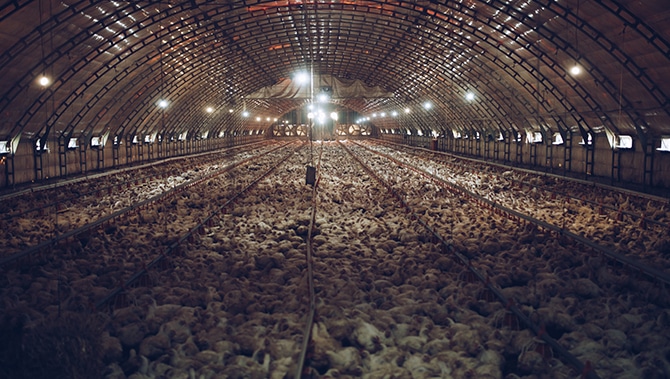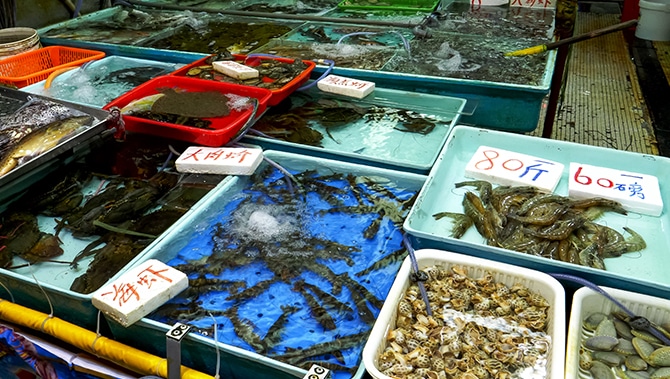“What do you hope our main takeaway is from COVID-19”, a friend asked during a video chat.
The group fell silent.
“Rethink our relationship with nature”, another friend answered.
I took a deep breath. I very much needed to hear that.
Over the past few weeks, millions of people had to adjust to a new reality. News about primaries faded out overnight giving way to a war against a common enemy. It’s not another race, class, nation, or ideology. It’s a cold-hearted virus. And we enabled it.
I am writing this article to emphasize that we should not react to COVID-19 as an one-off event. It is just a chapter of the ever-lasting tale of pandemics. Instead of only dealing with individual diseases as they come up, we need to fundamentally address the process that resulted in them. We need to rethink our relationship with wild animals, domesticated animals, and the meat we eat, otherwise the devastation of novel illnesses may outpace our ability to fight them sooner or later.
Pandemics and Animals
Almost all of our recent pandemics are linked to animals, either wild or domesticated:
- Ebola: bat -> intermediate host (chimpanzees, monkeys, etc) -> human (1)
- HIV: chimpanzee -> human (2)
- SARS: bat -> intermediate host -> human (3)
- H1N1: pig -> human (4)
- MERS: bat -> camel -> human (5)
- BSE (mad cow disease): cow -> human (6)

Most of the “emergent” viruses new to us are not new to wild animals. They have coexisted peacefully with these viruses for generations. With deforestation, sub-urbanization, and wildlife trades, wild animals are brought ever closer to humans. Unfortunately, we haven’t co-evolved with these viruses to develop any defensive mechanisms against them. Even if most of us don’t have exposure to wildlife, we do to domesticated animals. They sit on our dinner table. Besides being intermediate hosts, domesticated animals can also serve as direct host. We’ve seen that through mad cow disease and H1N1. Pandemics are a result of things we do to nature.
If there is anything we know, COVID-19 is not going to be the last pandemic of this scale. It’s going to get more and more frequent and global. A research study found 400 new strains of coronaviruses from bats (7), which means 400 potential candidates to spark another global outcry. If we don’t act on the root cause, then global shutdown, financial crashes, and long-term WFH will soon be too familiar to us.
Why is this happening?
The following processes are the main causes for an increase in human contact with animals:

Urbanization & deforestation
During the first decade of the 21st century, almost 200 million people moved to urban areas in East Asia (8). Rapid urbanization has forced countries to repurpose land for residential uses, which used to separate wildlife from humans. Wuhan, where the new coronavirus emerged, tripled in size between 2000 and 2018. As a result, two things are happening:

First, the distance between wildlife, such as bats, and humans rapidly decreased. Farmers start to see fruit bats in their homes. Close contacts can make disease spreading exponentially easier. Instead of the virus needing to find an intermediate host (usually via domesticated animals), it spreads directly to humans.
Second, deforestation kills off predators, including those that feed off rodents. As a result, the rodent population explodes, increasing the risk of zoonotic diseases.

Domestication of animals
Cattles, pigs, and chickens can serve hosts for diseases and pass on to humans through direct contact or eating. Modern day factory farming puts our health at significant risk.
- First, diseases can easily spread. For example, animals are jam-packed in cages; the cooling process puts all slaughtered animals through the same tank of freezing water. If one is sick, all are at risk.
- Second, animals are chronically stressed, which increases their likelihood of falling sick. Imagine being a salmon trapped in a net with 500 other fish and unable to breathe. Imagine having to lay an egg every 4 hours instead of 24 because the day has been artificially shortened to maximize productivity. Layer chickens live that life.
83% of all chickens are infected with either campylobacter or salmonella at the time of purchase. Who bears these consequences? Us. Who caused it? Us.
Wet market & bushmeat hunting

Wet markets are still prevalent in developing countries. In China, they were briefly closed after SARS, which also originated in wet markets, only to be opened later. Similarly, bushmeat hunting is widespread in sub-Saharan Africa, even though illegal on paper. Both of these practices happen in places with poor sanitation and create perfect opportunities for humans to be in direct contact with wild animals as well as sick animals.
What’s up with China & Africa?
Since COVID-19 started to spread outside China, finger-pointing has never stopped. People are blaming China & sub-Saharan Africa being the hub for pandemics. True, SARS, Ebola, HIV originated there, but let’s not forget that H1N1 originated in the US; MERS, Saudi Arabia; Zika, South America. I am stating these places of origin not to participate in more finger-pointing, but to show that there is no point in arguing “who started it”.
We live in this globalized world together. We are all equally vulnerable. It’s extremely important that countries stop using finger-pointing and focus on how to save ourselves long-term:
- Each country assumes the responsibility to reduce the chance of originating outbreaks. It’s still possible to get wildlife onto the dinner table in many countries. For this, the government and each individual are accountable.
- Help each other. There are lucky countries that are decades ahead of the others in terms of infrastructure, technology, and policy. These developed countries have a disproportionate responsibility to help developing countries reach a commonly agreed standard.
At the end of the day, we all have to bear with the consequences collectively for pandemics, no matter if you are American or Chinese.
Where do we go from here
We need to reduce our contact with animals as much as possible. Period. There are a few things we should do:
Restore forests
Research showed that a mere 4% deforestation in the Amazon would cause the chance of Malaria to go up by 50% (9). This is because deforested land provides the right environment for mosquitoes that transmit Malaria to thrive. We need to return real estate back to wildlife so they can happily live in their own habitat.
Make wildlife trade a public enemy
It doesn’t matter that wildlife trading is illegal on paper. It’s still happening. We need to build a culture of intolerance around it. It is not acceptable to own an ivory craft or a piece of fox skin. We should condemn the culture of eating “exotic food”. When you are offering crocodile, pangolin, or snake to your guest, you are putting the entire world at risk.
Improve sanitary standards of wet markets and factory farms
Governments need to enforce sanitary standards across wet markets or simply close them down. Consumers need to realize the risk of going to a wet market. Similarly, governments need to enforce higher sanitary standards across factory farms and slaughterhouses.
Becoming a vegetarian or significantly cut down meat consumption
Above all, the most effective individual action you can take that doesn’t involve anyone else buying your argument: become a vegetarian. Read more here:Why I became a vegetarianIt was Dec 31, 2017, the first day of my meditation retreat. I thought I was only going meatless for 10 days, not…medium.com

Remember, our fight against Pandemics won’t be over in a few months. We are in it for the long haul. For humanity to continue, we need to fundamentally realize our role in nature: we are just another animal species residing in the earth biosphere temporarily. In front of natural disasters such as hurricanes, earthquakes, and diseases, we are just as helpless as any of the other species. If we do not learn how to work with nature, we will cause our own extinction sooner or later. Our fate is in our own hands. There is no mercy to be spared when we reach the condition that condemns our own existence.
COVID-19 will soon only exist in our collective memory. We didn’t pay this heavy price for nothing if we let it serve as a wake-up call for humanity to fundamentally rethink our relationship with nature, so we can prevent hundreds of more coronaviruses from happening in the future. When we are ready, let’s take a step forward from this individual instance and tackle what’s ahead of us.
Sources:
- Ebola virus disease
- The evolution of HIV-1 and the origin of AIDS | Philosophical Transactions of the Royal Society B: Biological Sciences
- Bats, Civets and the Emergence of SARS
- H1N1 Flu | Origin of 2009 H1N1 Flu (Swine Flu)
- https://www.sciencedirect.com/science/article/pii/S1879625716000079?via%3Dihub
- Bovine Spongiform Encephalopathy (BSE) | Prions Diseases | CDC
- Bats In China Carry 400+ Coronaviruses With The Potential To Spill Over Into Humans : Goats and Soda
- East Asia’s Changing Urban Landscape
- https://www.nytimes.com/2012/07/15/sunday-review/the-ecology-of-disease.html?smid=fb-share&fbclid=IwAR3z0kffE2qTXabdD7RaGjz7_8z0PbNVumhEconqQprZYoRu2fuFfLG2AHM
This blog is published with permission from Mojia Shen

